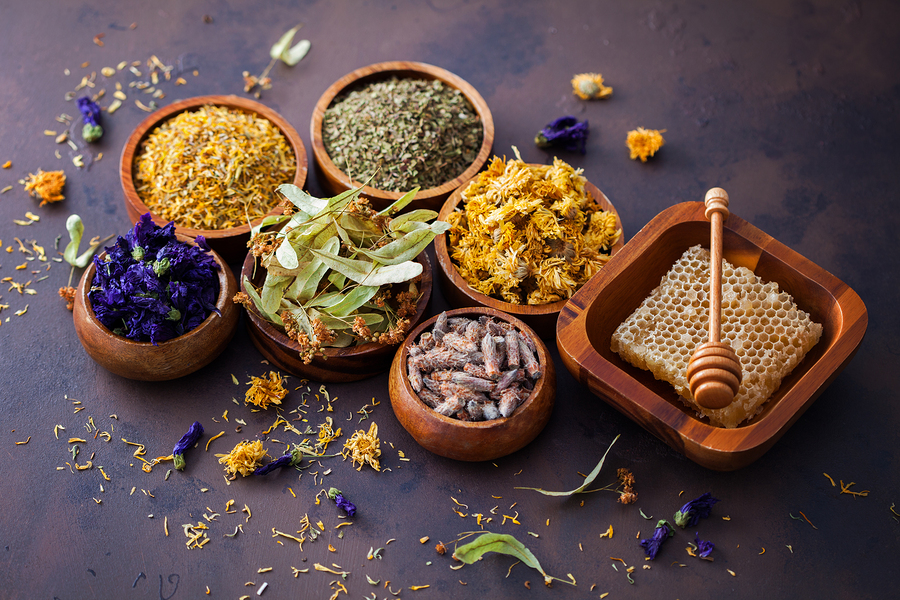The use of plants to heal an illness and enhance overall health and wellness is known as herbal medicine. Herbs should be used cautiously due to potential interactions with prescription drugs.
Whenever you have health problems, always consult your general practitioner (GP) and let them know about any herbal medications you are now taking or considering taking.
Never substitute herbs for prescription medications without first talking to your doctor.
When buying herbal medications online, exercise caution. Certain traditional folk medicines and other unregulated herbal remedies might not be produced to the same standards and quality as those that are.
What Is Herbal Medicine?
The origins of herbal medicine can be traced back to ancient civilizations. It involves utilizing plants for medicinal purposes to treat illnesses and improve overall health and wellness.
Given their robust (strong) components, certain herbs have to be used with the same care as prescription drugs. A lot of pharmaceutical drugs are manufactured products of naturally occurring plant-based products.
Herbal Medicine For Wellness
1. Echinacea
Coneflower, or Echinacea, is a flowering plant that is used in herbal remedies.
It comes from North America and has been used for a long time in Native American medicine to cure a wide range of conditions, such as burns, wounds, toothaches, sore throats, and unsettled stomachs.
The plant’s leaves, petals, and roots are among its most useful parts for medical purposes; nevertheless, many people think the roots have the most impact.
Echinacea can be used topically but is usually consumed as a tea or supplement.
The common cold is the main use for it nowadays, albeit there isn’t much scientific support for this.
Potential Benefits and Risks
A review of over 4,000 people suggests a possible 10–20% lower risk of colds with echinacea use. However, evidence supporting its effectiveness in treating colds after infection is scarce. Short-term use of echinacea is generally considered safe, but side effects like nausea, stomach pain, and skin rash have been reported occasionally. Echinacea is readily available in supermarkets, health food stores, and online.
Echinacea is a flowering plant often used to treat and prevent the common cold. Research is little, but it may decrease your risk of seeing a cold by up to 20%.

2. Ginseng
Ginseng is a medicinal plant whose roots are usually steeped to make tea or dried to make a powder.
It’s frequently utilized in traditional Chinese medicine to reduce inflammation and boost immunity, brain function, and energy levels.
Several varieties exist, but the two most popular are the Asian and American types — Panax ginseng and Panax quinquefolius, respectively. American ginseng is thought to cultivate relaxation, while Asian ginseng is considered more stimulating.
Potential Benefits and Risks
Research on ginseng’s immune-boosting, anticancer, and antidiabetic benefits in test tubes and animals has shown promise due to its neuroprotective ginsenosides. Human research is scarce, though. While long-term safety is yet unknown and there is a chance of unpleasant side effects such as headaches, disturbed sleep, and stomach problems, short-term use is usually harmless. Ginseng is widely used in traditional Chinese medicine to support immunity, brain function, and energy levels. It may be found in health food stores and online.
3. Ginkgo Biloba
The herb ginkgo biloba, often referred to as just “ginkgo,” is made from the maidenhair tree.
Ginkgo, a native of China, has been a popular herbal supplement for thousands of years and is used in traditional Chinese medicine. It has several strong antioxidants in it that are known to have many benefits.
While most modern applications use leaf extract, the seeds and leaves are still historically utilized for making teas and tinctures.
Some people also like to consume roasted seeds and raw fruit. The seeds should only be consumed in moderation, if at all, due to their mild toxic effects.
Unproven Health Benefits
Ginkgo, often touted for treating heart disease, dementia, and sexual dysfunction, lacks scientific evidence supporting its usefulness for these conditions. While generally well-tolerated, possible side effects include headaches, heart palpitations, digestive issues, skin reactions, and increased bleeding risk. Ginkgo supplements are available online and at supplement shops.
4. Elderberry
An ancient prescription for elderberry, an ancient herbal remedy, calls for cooked Sambucus nigra fruit. It has been used for a very long time for the treatment of constipation, colds, viral infections, headaches, and nerve discomfort.
These days, the main reason it’s sold is that it relieves cold and flu symptoms.
Elderberry comes as syrup or lozenges; however, there is no recommended dosage. Some people like to cook elderberries with other ingredients, including honey and ginger, to make their syrup or tea.

Potential Cold and Flu Remedy
Elderberry exhibits antioxidant, antimicrobial, and antiviral properties in test-tube studies, but lacks substantial human research. Limited human studies suggest it may shorten flu duration, but larger trials are needed. Short-term use is safe, but raw or unripe fruit is toxic, causing symptoms like nausea and diarrhea. Elderberry is available in health shops and online, but caution is advised regarding raw consumption.
5. Turmeric
Turmeric is also an herb which belongs to the ginger family.
It has been used for thousands of years in cooking and medicine alike, now it has garnered awareness for its powerful anti-inflammatory effects.
Curcumin is the main active combination in turmeric. It may treat a host of diseases, like chronic inflammation, aches, metabolic syndrome, and stress.
Effective For Arthritis Pain
Multiple studies reveal that curcumin supplements are as useful as some anti-inflammatory medications for arthritis pain relief. Turmeric and curcumin supplements are normally safe, but high doses may cause side impacts like diarrhea or headache. Using fresh or dried turmeric in cooking is an alternative, although its medicinal impact is likely limited. View purchasing supplements online for optimal benefits.
6. Ginger
Ginger is also herbal medicine and a commonplace ingredient. You can use it fresh or dried, though as a tea or capsule.
Like turmeric, ginger is a rhizome, or stem that plants underground. It has many beneficial combinations and has long been used in traditional and folk traditions to treat colds, nausea, migraines, and high blood pressure.
Its best-established everyday help is for reducing nausea associated with pregnancy, chemotherapy, and medical operations.
Versatile Herbal Remedy
Ginger reveals possible benefits in treating situations like heart disease and cancer, with some evidence recommending it may reduce blood clot formation. Well-tolerated with irregular side effects, ginger is widely recognized for its anti-nausea properties. Ginger supplements are available at local supermarkets and online.
7. Hypericum perforatum
Hypericum perforatum a flowering plant commonly known as St John’s Wort an herbal medicine that is yellow flowers is commonly used to make teas, capsules, or extracts. Studies have suggested that St John’s Wort is just as effective as some pharmaceutical antidepressants in treating mild to moderate depression. It is also used for anxiety and insomnia. However, St John’s Wort can interact with several prescription medications, including the oral contraceptive pill, and stop them from working properly.
Natural Antidepressant with Caution
For people with moderate to severe depression, St. John’s Wort is believed to be just as helpful as some antidepressants; however, it can interact with the effectiveness of various medicinal products, including contraceptives. Its origins in history date back to ancient Greece, and in some regions of Europe, it is still regularly recommended.
There are limited long-term safety and efficacy data available, particularly for severe depression, even though short-term use demonstrates effectiveness comparable with traditional antidepressants. Allergy responses, light sensitivity, disorientation, dry mouth, and dizziness are examples of side effects. Because some medications may interact fatally, caution should be taken when using them. Before using any medication, speak with a healthcare specialist. It is simple to find St. John’s Wort both online and in stores.
Frequently Asked Questions [FAQs]
How does herbal medicine help your body?
Herbal medicines help in promoting health and treating chronic conditions, particularly when traditional treatments are ineffective. They may also be utilized in advanced cancer and emerging infectious diseases.
Who invented herbal medicine?
The study of herbs dates back over 5,000 years to the Sumerians, who documented medicinal plants on clay tablets, including myrrh and opium.
Content Disclaimer
The information on this website should not be used as a substitute for professional medical advice; rather, it is offered for informative reasons only. It is not meant to serve as an all-inclusive manual for any kind of therapy, product, or treatment. For medical advice and a diagnosis, users are recommended to speak with a licensed healthcare provider. Reliance on the information on this website is at no risk to the State of Victoria or the Department of Health.
Read More:
11 Tech Gadgets To Improve Your Health

